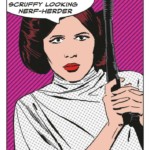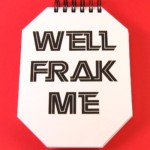You might be surprised to learn that it is very difficult to make up swear words and slang for a fantasy world–especially phrases that, when read aloud, don’t sound like you’re saying something stupid like, “By Glurf’s right eye patch!”
Where we tend to see the most made up swear words and slang is in science fiction (and fantasy too, but Sci-Fi tends to be more in the public eye). Science fiction in particular is well-known for its made up phrases because they take place in the future, rather than just another country. As such, they have to take into account what’s happened in society for the last few made-up centuries, and decide how language patterns might have changed, and then be adapted for that show’s particular feel. Oh AND they have to sound good to the viewing (or reading) public, or else suffer in shame and infamy for sucking.
Here are some well-known fantasy & science fiction fake swear words:
Whether or not they succeeded in being acceptable swear word replacements is an entirely different matter (people either love or hate them, there is no in-between). The other reason for making up words like these is so the characters can cuss up a storm and not get censored (if on film/tv) by the networks.
And here are some well known made up slang phrases:




So What Makes a Made-Up Word…Work?
Not to sound too research-y, but Stephen Fry (actor/comedian/English guy) did an episode on cursing several years ago, and his findings are pretty insightful in coming up with a new system of slang and swearing.
He found that most swear words pretty much revolve around poop, sex, and/or religion.
Well, those and the taboos or reverence associated with those things. The reason is because those topics are typically surrounded by negative emotions such as disgust, dread, revulsion, etc. Weird, right? But, looking at the English language’s selection of swear words, he’s definitely not wrong. I wish I’d thought of it in terms like when I was first developing Mira and the Magins, but I think what I ended up with more or less fit the bill.
Creating Slang & Swear Words for the Unseen Realm
When I wrote the first couple of drafts, Mira & the Magins was intended for a slightly older reader (14-16) and I had a whole slew of swear words in there. Obviously I’ve had to take them all out, but that meant they had to be replaced with something I could tolerate.
You might not be familiar with the t.v. show Firefly, but the show had a slang word that just…bothered me. Don’t get me wrong, I love (present tense) the show, but that one word never felt natural. Although I eventually accepted it as a quirk of the show, and wasn’t bothered by the other words they made up, I vowed that any fake word I came up with wouldn’t give me that same feeling. The word was ‘shiny’ (meaning ‘cool!’).

So, Where To Start?
Well, I have a fantasy, magic-based society on my hands, but the magins don’t have a deity or religion (although they’re created by humans, magins don’t revere them). Also, most of the fantasy curse generators I found online called for a deity to make things work, so that didn’t help. Then I read The Maze Runner.

Well hello there, made-up cuss words! This book, more than any other, made me realize that I could (relatively) easily have my characters cussing up a storm without being offensive, so long as I used stand-in words that jived with their culture. I mean, they used the word ‘klunker’ for S*** H****. GENIUS.
Back to my story: my book’s character culture (for magins) is magic and fantasy. Since I play Dungeons & Dragons and a lot of other games, I figured that the phrases for failure or consequences related to magic would be a good starting point. From there I tried to also find words that had the same ‘oomph’ that cuss words tend to have (also not easy).
Magin Swear Words:
I ended up with the following words, most of which start with the first letter of the cuss word they (try to) replace (or rhyme):
Crit – short for critical; while it’s usually meant as a good thing in video games (a critical hit does much higher than normal damage to enemies), it can be an equally bad thing in Dungeons & Dragons, such as a critical failure. This is when you roll a 1 on a 20-sided dice for an action, and end up stabbing yourself in the foot rather than your enemy (or much, much worse). More on this on the Fun Stuff! Page!
Fizzle – this isn’t from a game, but the idea is similar to ‘crit,’ just on a lesser scale. Think of it as a fumble–someone tried to cast something, but instead of a huge blow-back that you have to deal with (a critical failure), the spell merely fizzles out and you’ve wasted the magic and energy for nothing. Like paying $10 for a Chipotle bowl and then dropping it all over the floor on your way to a table.
Dampen – first and foremost, this has nothing to do with the word ‘moist’ (eew). No, if you dampen the magic of others, you’re reducing the effectiveness of their magic. This kind of spell is usually used to reduce the damage the other side can do to you with magic, or reduce the amount of healing they can do to their allies (which helps you). In the Unseen Realm, every so often there is a magin whose Unique ability is to dampen the magic of those around them, like an aura, which tends to make them quite unpopular (hence it being a curse word).
‘Nish – short for ‘banished’ or ‘banishment,’ it is used instead of ‘hell’ because being banished is effectively being sent to what humans would identify as hell. If a magin is deemed too dangerous, either to themselves or others (such as those with violet magic), or if they’ve committed heinous crimes against another, they’re banished from the safety of the city. This means that they no longer have access to the magic in either the city or the real world, which means they can no longer replenish their magical essence. The more magic they cast to protect or amuse themselves in their exile, the closer they come to using up all of the magical energies that make up their core essence. Once they use up all of their magic, they fade away into nothingness.
Magin Slang:
Fade – as mentioned directly above, fading is equivalent to dying for magins. Since they’re created, not born, they can’t die in the way that humans do. Instead, they will fade away if their magical essence is used up (or obliterated, such as by blue destructive magic).
Mage – in this series, I use the word ‘Mage’ as a title signifying the person is in the topmost level of their society’s hierarchy. Only three magins are currently entitled as ‘Mage’: Mage Dathas, Mage Lodin, and Mage Zeoni (all of whom can be seen on my character page).
‘a Unique’ – every magin has a unique ability. They’re not always awesome or useful, but only one magin in existence at a time will have any particular unique gift. If a magin fades, then their Unique is effectively placed back into the Spark portal, and another magin may someday have that gift, although it’s not guaranteed. Most magins, when they’re assessed for their magical class (color of magic), either know or discover in the assessment what their Unique is–but not always. Sometimes it’s difficult to discern because it could be very weak, it could be a skill that everyone else has but is slightly augmented, or it could be a passive ability that doesn’t appear until certain conditions are met. Most of the time Uniques are well-known to others, since new magins like to boast about their abilities when they’re first created as a means of making themselves stand out. But some magins prefer to keep their Unique to themselves. The Council has access to the records of everyone’s Unique abilities, but the list isn’t public.
Port – short for ‘teleport.’ I really wanted to use the word ‘blink,’ but it was a little too risky, given its frequent use in certain video games and films.
Mes-Orbs – short for ‘message orbs’; while some magins have telepathic capabilities, either from a Unique, an augmented ability, or through studying of specific spells, most don’t. Since magins don’t have phones, they send pre-recorded message orbs to each other, even between the worlds, or they can effectively have hologram-like video chats with each other via mes-orbs.
Epic – Clearly not something I created, and I know it’s overused. TRUST ME, I know. But, I’m still a gamer, and apparently that’s reflected in Gimmer’s speech patterns.
Thanks for reading!






